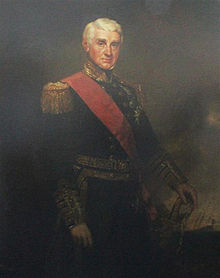Thomas John Cochrane
| Sir Thomas Cochrane | |
|---|---|

Admiral Sir Thomas Cochrane
|
|
| Born |
5 February 1789 London, United Kingdom |
| Died | 19 October 1872 (aged 83) Quarr Abbey House, Isle of Wight |
| Buried at | Kensal Green Cemetery |
| Allegiance |
|
| Service/branch |
|
| Years of service | 1796–1856 |
| Rank | Admiral of the Fleet |
| Commands held |
HMS Nimrod HMS Jason HMS Ethalion HMS Surprise HMS Forte Governor of Newfoundland East Indies and China Station Portsmouth Command |
| Battles/wars |
French Revolutionary Wars Napoleonic Wars War of 1812 First Opium War |
| Awards | Knight Grand Cross of the Order of the Bath |
Admiral of the Fleet Sir Thomas John Cochrane GCB (5 February 1789 – 19 October 1872) was a Royal Navy officer. After serving as a junior officer during the French Revolutionary Wars, he captured the French ship Favourite off the coast of Dutch Guiana and then took part in various actions including the capture of the Virgin Islands from Danish forces, the capture of the French island of Martinique and the capture of the French archipelago of Îles des Saintes during the Napoleonic Wars. He also took part in the burning of Washington and the attack on Baltimore during the War of 1812.
Cochrane went on to serve as colonial governor of Newfoundland and then as Member of Parliament for Ipswich before becoming Commander-in-Chief, East Indies and China Station and then Commander-in-Chief, Portsmouth.
Born the son of Admiral Sir Alexander Cochrane and Maria Cochrane (daughter of David Shaw and widow of Sir Jacob Wheate, 5th Baronet), Cochrane joined the Royal Navy in June 1796. He was appointed as a first class volunteer to the fifth-rate HMS Thetis on the North American Station and, having been promoted to midshipman, transferred to the third-rate HMS Ajax in the Channel Squadron early in 1800. In HMS Ajax he saw action supporting French Royalist exiles at Quiberon in Spring 1800, escorting troops for an abortive landing at Belle Île in May 1800 and taking part in the equally unsuccessful Ferrol Expedition in August 1800 before landing troops in Egypt in preparation for the more successful Battle of Alexandria in March 1801 during the French Revolutionary Wars.
...
Wikipedia
